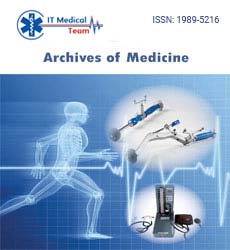Dogan Zeytun*
Department of Internal Medicine, University of Health Sciences, Turkey, Antalya, Turkey
- *Corresponding Author:
- Dogan Zeytun
Department of Internal Medicine
University of Health Sciences
Antalya, Turkey
E-mail: dgzeytun@erincan.edu.tr
Received Date: April 20, 2021; Accepted Date: April 25, 2021; Published Date: April 30, 2021
Citation: Zeytun D (2021) Pharmacological Treatments for Coronavirus Disease (COVID-19). Arch Med Vol. 13 No. 4: 20.
Editorial
Infection by the SARS-CoV-2 virus, recognized as COVID-19
(Coronavirus Disease-19) was initially noticed in China in
December 2019, and has subsequently spread rapidly throughout
the world, WHO reported that the outbreak could be defined as a
pandemic. Coronavirus disease ranges from mild flu-like events to
severe and even life-threatening conditions, predominantly due
to acute respiratory failure. The early stage would be considered
by a high viral fever; in a second stage, the inflammatory response
is predominant where anti-inflammatory drugs play an important
role. The emerging pandemic of COVID-19 caused by the different
severe acute respiratory syndrome coronavirus 2 presents
an unprecedented challenge to identify effective drugs for
anticipation and treatment for healthcare systems globally. The
fast expanding information regarding severe acute respiratory
syndrome coronavirus 2 virology provides a substantial number
of potential drug targets. Drugs that are effective against SARSCoV-
2 have yet to be established. The most promising treatment
is remdesivir. RDV (Remdesivir) not only in vivo but also in vitro
testing shows the inhibition of human coronavirus replication,
including SARS-CoV as well as ritonavir/Lopinavir that shows
promising anti-viral drug against SARS-CoV-2. Remdesivir (RDV)
has strong in vitro activity against SARS-CoV-2.
Remdesivir (RDV) is a nucleotide analogue. It is metabolized
intracellularly into an active triphosphate adenosine analogue
that inhibits viral polymerase RNA. Though, antiviral actions
were also demonstrated against single‐stranded RNA viruses,
including MERS and SARS‐Cov. Hydroxychloroquine/Chloroquine
could impair the replication of SARSCoV-2 by multiple devices
and their immunomodulatory properties could upgrade clinical
exhibitions that are mediated by immune reactions of the host
although its beneficial effects are under question and need to
be proven at the clinical level. Recent results from a preclinical
study indicated that, in vitro, the connotation chloroquine/
Remdesivir could be extremely effective in controlling the SARSCov‐
2 infection. The pharmacokinetics of Remdesivir has been
concise in compassionate use documentation published by the European Medicines Agency (EMA, 2020). RDV is administered
via an intravenous injection with a loading dose on day 1 (200
mg in adults, adjusted for body weight in Pediatric patients)
followed by a daily maintenance dose (100 mg in adults) for up
to 10 days. Importantly, Remdesivir inhibits viral replication;
Remdesivir (RDV) binds to RNA-dependent RNA polymerase
(RdRp) and acts as RNA chain terminator. It exhibits effective in
vitro activity against SARS-CoV-2 with an EC50. RDV (Remdesivir)
is very discerning for viral polymerases, hence a low tendency
to cause human toxicity. Adverse effects, including hepatic and
gastrointestinal dysfunction, and infusion site reactions were
reported to be associated with Remdesivir (RDV) therapy.
On May 1, 2020, the Food and Drug Administration (FDA) issued an
Emergency Use Authorization (EUA) for emergency use of RDV for
the treatment of hospitalized 2019 COVID-19 patients based on
review of the top line data from the Gilead-sponsored open-label
trial that evaluated different durations of RDV (NCT04292899),
and from the randomized, double-blinded, placebo-controlled
trial conducted by NIAID (NCT04280705) (FDA, 2020).
RDV might be crucial for ensuring an efficient treatment, decrease
mortality and allow early discharge in relation to Covid-19. Current
randomized, placebo-controlled trials are critical in describing
its efficacy. Maximum drugs presently used for COVID-19 are
approved antiviral agents or antibodies against diseases other
than COVID-19.
36758






